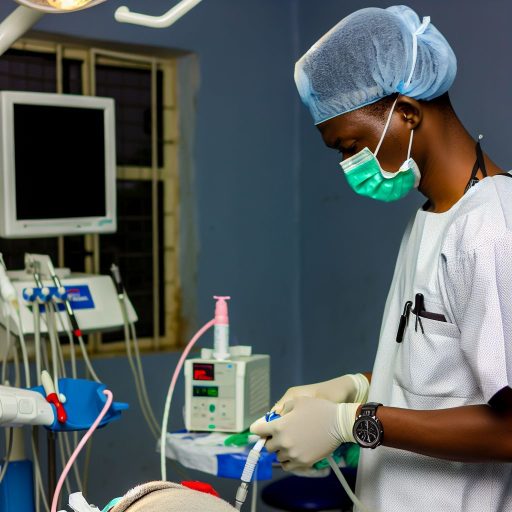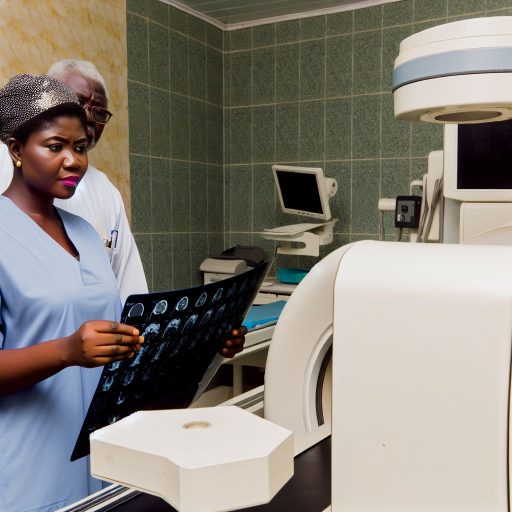Introduction:
Blood bank services in Nigeria are critical for saving lives in emergencies.
Medical procedures also benefit from blood donations.
Donating blood is crucial as it can help patients with various conditions.
Patients with anemia or those undergoing surgeries need blood.
Blood banks play a vital role in the healthcare system.
They ensure a constant supply of safe blood for transfusions.
History of Blood Bank Services in Nigeria:
Blood bank services in Nigeria have come a long way since their inception.
The evolution of blood banks in the country can be traced back to early efforts to provide safe and reliable blood transfusion services to the population.
Over the years, several milestones have been achieved in the development of blood donation services, leading to improved access to life-saving blood products for patients in need.
However, the establishment and maintenance of blood banks in Nigeria have not been without challenges.
One of the key challenges faced in establishing blood banks in Nigeria is the lack of adequate infrastructure and resources.
Blood banks require specialized equipment, trained staff, and proper storage facilities to ensure the safety and quality of blood products.
In many parts of the country, these essential resources are limited, making it difficult to set up and maintain blood banks that meet international standards.
Another challenge is the shortage of voluntary blood donors.
While there is a growing awareness of the importance of blood donation, many Nigerians still rely on replacement donors or family members to provide blood in times of need.
This practice can lead to issues such as limited availability of rare blood types and increased risk of transfusion-transmitted infections.
Furthermore, the issue of blood safety and quality remains a concern in Nigeria.
Proper screening and testing of donated blood are essential to prevent the transmission of infectious diseases.
Yet some blood banks in the country may not have access to the necessary testing kits or may not follow standard protocols for blood screening.
This can put both donors and recipients at risk of harm.
In recent years, efforts have been made to address these challenges and improve blood bank services in Nigeria.
The National Blood Transfusion Service (NBTS) was established to coordinate blood donation activities and ensure the provision of safe and adequate blood supply across the country.
The NBTS works to promote voluntary blood donation, improve infrastructure, and enhance blood safety through training and capacity-building initiatives.
Despite these efforts, there is still much work to be done to strengthen blood bank services and availability in Nigeria.
Increased investment in blood banking infrastructure, education, and outreach programs is essential to meet the growing demand for blood products and improve access to safe and reliable transfusion services for all Nigerians.
Current Status of Blood Bank Availability:
- Number of blood banks across different states in Nigeria
- Comparison of urban and rural areas in terms of blood bank availability
- Accessibility and adequacy of blood banks in meeting the demand for blood
Number of Blood Banks Across Different States in Nigeria:
There are approximately 100 blood banks in Nigeria spread across various states.
These blood banks are essential in providing life-saving blood transfusions to patients in need.
Comparison of Urban and Rural Areas in Terms of Blood Bank Availability:
In urban areas, there is generally better access to blood banks compared to rural areas.
Major cities and metropolitan areas tend to have multiple blood banks.
Rural communities may have limited or no access to these facilities.
Accessibility and Adequacy of Blood Banks in Meeting the Demand for Blood:
Despite the presence of blood banks in different states, there are challenges in meeting the demand for blood.
Issues such as inadequate infrastructure, lack of funding, and insufficient blood donation drives contribute to shortages in blood supply.
Delve into the Subject: Top ENT Hospitals and Clinics in Nigeria
Regulation and Accreditation of Blood Banks:
- Overview of regulatory bodies overseeing blood banks in Nigeria
- Criteria for accreditation of blood banks
- Importance of adherence to regulations for the safety of blood supply
Regulatory Bodies Overseeing Blood Banks in Nigeria
The regulatory bodies responsible for overseeing blood banks in Nigeria include the National Blood Transfusion Service (NBTS) and the Federal Ministry of Health.
These bodies are tasked with ensuring that blood banks operate according to established guidelines and standards to guarantee the safety and quality of blood supply in the country.
Criteria for Accreditation of Blood Banks
To attain accreditation, blood banks in Nigeria must meet specific criteria set by regulatory bodies.
These criteria typically include having qualified personnel, adequate facilities, proper equipment, and adherence to strict protocols for blood collection, processing, storage, and distribution.
Transform Your Career with Expert Guidance
Get personalized mentorship consulting that’s tailored to your unique path. Our expert advice is actionable and exclusive.
Get StartedAccreditation ensures that blood banks maintain high standards of safety and quality in their operations.
Importance of Adherence to Regulations for Blood Supply Safety
Adhering to regulations is crucial for ensuring the safety of the blood supply in Nigeria.
By following set guidelines and standards, blood banks can minimize the risk of contamination, transmission of infections, and other potential hazards associated with blood transfusions.
Strict adherence to regulations helps safeguard the health and well-being of both blood donors and recipients.
The regulation and accreditation of blood banks play a vital role in maintaining the safety and quality of the blood supply in Nigeria.
By upholding established standards and guidelines, regulatory bodies and accredited blood banks contribute to the overall effectiveness and reliability of the healthcare system in the country.
You Might Also Like: Success Stories: Nigerian Biomedical Technologists
Challenges Faced by Blood Banks in Nigeria
Blood banks in Nigeria often struggle with a shortage of blood donors.
This leads to inadequate blood supply.
Many blood banks in Nigeria lack proper infrastructure and equipment.
This affects their ability to store and process blood efficiently.
Limited funding and resources pose a significant challenge for blood banks.
This hinders their ability to provide essential services.
Addressing these challenges is crucial to improving the availability of blood services.
Efforts to increase the number of blood donors must be prioritized.
Strengthening infrastructure and equipment in blood banks is essential.
Securing adequate funding will ensure efficient operations.
These actions will help meet the growing demand for blood transfusions in the country.
See Related Content: Government and Private Support for Ophthalmology in Nigeria

Strategies for Improving Blood Bank Services:
Public awareness campaigns for blood donation.
Collaboration with healthcare institutions and communities.
Training and capacity-building for blood bank staff.
Improving blood bank services in Nigeria is crucial to ensuring adequate and safe blood supply for patients in need.
Here are some strategies that can be implemented to enhance the quality and availability of blood bank services:
Public Awareness Campaigns for Blood Donation
One of the most effective ways to improve blood bank services is to increase public awareness about the importance of blood donation.
Many people in Nigeria are still unaware of the need for regular blood donations and the impact it can have on saving lives.
By conducting targeted awareness campaigns through various media channels, including social media, radio, and television, more people can be encouraged to donate blood voluntarily.
These campaigns should emphasize the significance of blood donation in emergencies, surgeries, and the management of certain medical conditions.
Collaboration with Healthcare Institutions and Communities
Collaborating with healthcare institutions and communities can help expand the reach of blood bank services and ensure a steady supply of blood.
Health facilities, such as hospitals and clinics, can be encouraged to organize regular blood donation drives for their patients and employees.
Community outreach programs can also be established to engage local residents in donating blood regularly.
By fostering partnerships with different stakeholders, blood banks can create a network that supports their mission of providing safe and reliable blood transfusions to those in need.
Training and Capacity-building for Blood Bank Staff
Investing in training and capacity-building for blood bank staff is essential for maintaining high-quality blood bank services.
Proper training will ensure that staff members are equipped with the necessary skills and knowledge to handle blood donations safely and efficiently.
Continuous education and training programs can also help improve the overall quality management systems of blood banks, including donor recruitment, testing, processing, and distribution.
By investing in the professional development of blood bank staff, institutions can enhance their capacity to deliver timely and effective blood transfusion services to patients.
Discover More: Voice and Throat Surgeries: Options in Nigeria
Importance of Voluntary Blood Donation:
- Encouraging voluntary donation over replacement donation
- Benefits of voluntary donation in ensuring a safe and sustainable blood supply
- Ways to incentivize and motivate people to donate blood voluntarily
Voluntary blood donation plays a crucial role in the health sector.
It provides a sustainable and safe supply of blood to those in need.
Here are the reasons why voluntary donation is essential:
Encouraging voluntary donation over replacement donation.
Voluntary donations are more reliable and safer compared to replacement donations.
When individuals willingly donate blood, they are more likely to undergo the necessary health screening.
This ensures that the blood can be used safely for transfusions.
Benefits of voluntary donation in ensuring a safe and sustainable blood supply.
Voluntary donors are less likely to have underlying health conditions or infections.
These factors could contaminate the blood supply.
This results in a higher quality of blood available for transfusions.
It reduces the risk of complications for patients who receive the blood.
Ways to incentivize and motivate people to donate blood voluntarily include:
Organizing blood donation drives in communities, workplaces, and educational institutions can help raise awareness.
These drives highlight the importance of voluntary donation.
Offering incentives such as free health check-ups, blood donation certificates, or small tokens of appreciation can motivate more people.
Additionally, creating partnerships with local businesses to sponsor blood donation events can encourage voluntary donation.
Providing regular updates on the impact of blood donations is essential.
Sharing stories of individuals whose lives have been saved by blood transfusions can inspire others.
Promoting voluntary blood donation is crucial for maintaining a sufficient supply.
By incentivizing individuals to participate, we can ensure that hospitals have enough blood to save lives.
Significance of Blood Bank Services
The significance of blood bank services cannot be overstated in the context of saving lives.
We urge readers to actively participate and support blood donation initiatives to ensure a sustainable supply.
Looking ahead, there is hope for the enhancement and broadening of blood bank services in Nigeria.
Additional Resources
The Lancet Nigeria Commission: investing in health and the future of …
When getting there is not enough: a nationwide cross-sectional …




